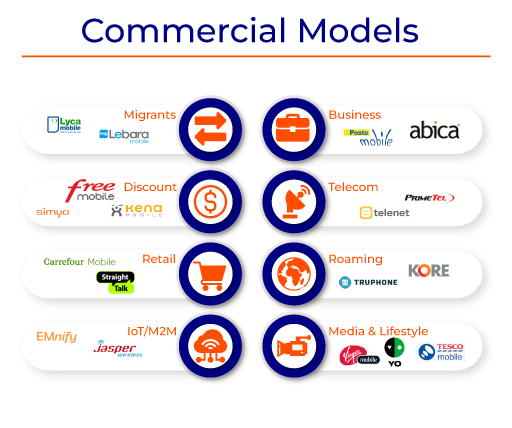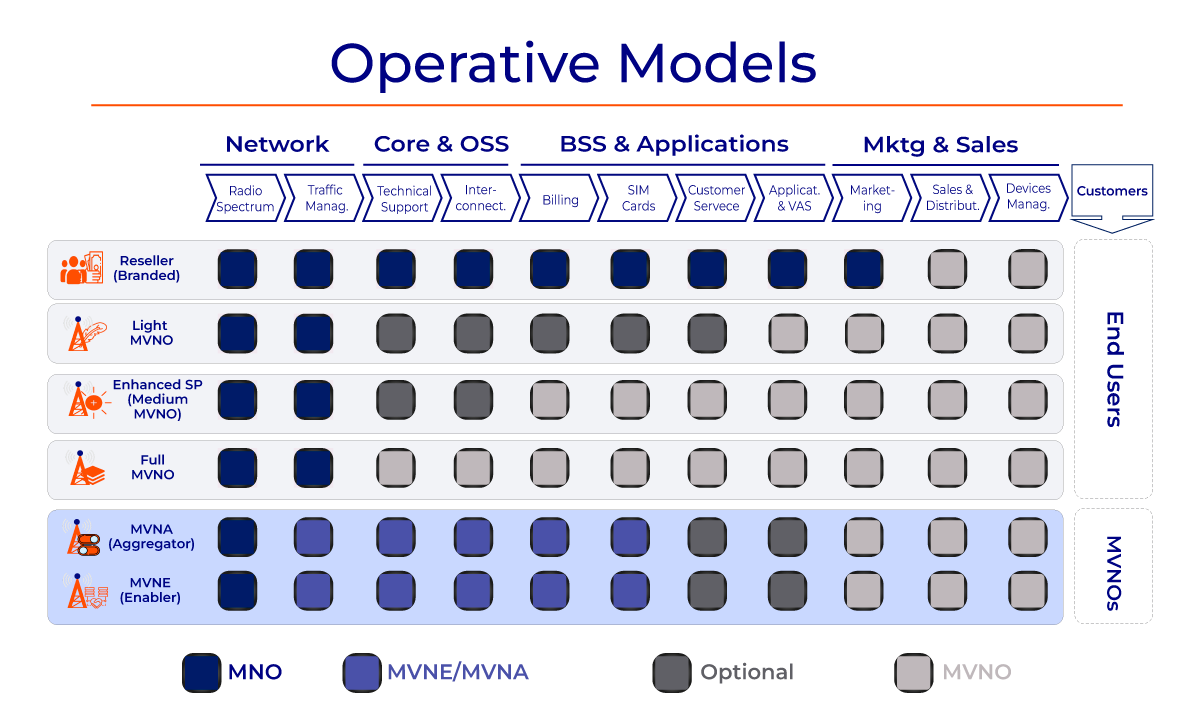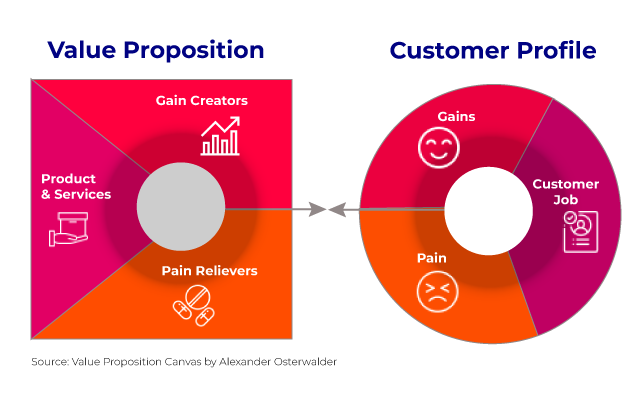VMNO telecom provides in-depth knowledge of the Telecommunication Market to help any company develop a successful MVNO strategy to enter the mobile market in its respective country regardless of its original business focus.
Our experience covers the entire ecosystem, which includes:
Mobile Virtual Network Operator: The MVNO is a mobile operator with no telecommunications infrastructure, which leases spectrum capacity from Mobile Network Operators (MNOs) and additional facilities, offering voice, mobile data, and value-added services with flexible plans and an approach where the differentiation has much higher relevance in their business model.
Mobile Virtual Network Enabler: The MVNE helps MVNOs with Operative and Billing Systems (OSS and BSS). Typically, the MVNE does not own the network sharing agreement with the MNO, but it provides service directly to the MVNO. Sometimes, the MNO establishes a partnership with an MVNE to manage operational integration with MVNOs in a standardized manner.
Mobile Virtual Network Aggregator: the MVNA owns the network sharing agreement with the MNO. It resells spectrum capacity to several MVNOs, summing up the traffic of all connected MVNOs to reach high volume and economies of scale. The MVNA controls the upstream value chain.
Based on extensive research and experience working on various MVNO launches, VMNO assists the MVNO candidate in defining the operative and commercial model given the competitive landscape and the relative positioning of the incumbent competitors in the relevant market.
MVNOs have different commercial models that shape their marketing strategy.
MVNOs implement strategies with economic viability offering competitive prices, targeting market niches, service convergence, and leveraging new technologies.
| Migrant: it is an MVNO whose primary offering focuses on international voice and local data services.
Business: an MVNO whose primary offering targets business customers with business-driven VAS. Discount: an MVNO whose main proposition is low-cost services. Retail: an MVNO associated with the consumer retail industry, leveraging Brand and many sales points. Roaming: it is an MVNO offering targeting international travellers through roaming agreements with MNOs across multiple markets. IoT: an MVNO that supports (embedded) machine-to-machine services and IoT applications in Industry, Supply Chain, IT and others Media/Lifestyle: an MVNO associated with the media or entertainment industries. |
 |
Operational Models are all about which element of the value chain the MVNO controls, with implications on management and economics.
VMNO Telecom has extensive experience and the technical know-how to help clients define their operational model strategy in conjunction with MNO negotiation. Moreover, we support skill assessment and team-building according to the model.
MVNOs have different strategic optional operational models:

Reseller (Branded Reseller): the MVNO operates under its Brand or co-branding with the MNO bringing assets such as Brand, distribution channels or a large existing customer base to leverage its sales. Implementing this model is the easiest and fastest, but the margin is low, and the MVNO has no customer ownership.
Service Provider (Light MVNO): the MVNO brings the business concept, Brand, integrated product strategies, distribution channels and access to a large customer base. In general, an MVNE (Enabler) or an MVNA (Aggregator) manages the service platform and billing (OSS and BSS).
Enhanced Service Provider (Medium MVNO): the MVNO operates under its Brand. It has the option to own SIM cards and the numbering range/mobile network code. These MVNOs can develop value-added services, integrate product and service portfolios, leverage sales, or differentiate from the competition independently or through a third-party MVNE partner.
Full MVNO: a full MVNO operates technically like an MNO without owning licenses for spectrum and antennas. The full MVNO is responsible for the operations, customers, and data, with complete control over all the services and products. It has maximum flexibility in designing and deploying new services, integrating with OTT, Apps, VAS or addressing new market segments (e.g. M2M, IoT). But, it requires the highest upfront investment.
|
Commercially, MVNOs bring additional segments into the subscriber base of the host operator networks (MNO) by focusing on specific niche target segments of customers. To sharpen and optimize the marketing strategy, we help our clients create customer profiles and understand the ideal buyer segments’ demographic and behavioural traits. |
 |
|
Brand strength assessment and market segmentation to determine emerging niche markets beyond traditional marketing approaches of Mobile Network Operators (MNO). We develop a framework to help position a product or service around the customer’s values and needs. The Value propositions play a significant role in the strategy. While one of the essential strategic principles, the value proposition concept requires understanding and executing effectively. |
 |
Build MNO relationships to define a win-win agreement and assist in negotiating a viable and adaptable contract.
The MVNO must show complementarity in the value proposition and market positioning to succeed in this area, avoiding competing directly with the host MNO.

Our competitive benchmark comprehends to develop grids with relevant operators competing for the same target market to identify relative advantages and disadvantages in key success factors, such as pricing, distribution, Brand, and QoS.
On the supply side, we regularly undertake audits and develop supplier negotiating strategies on behalf of our clients to drive profitable improvements in applications and technology acquisition.
VMNO Telecom has worked with several mobile operators to review these pitches and decide whom to partner with and work client-side in MVNOs. We are uniquely skilled in helping our clients develop the right angle to secure your operator deal.

MVNOs have different commercial models that shape their marketing strategy.
MVNOs implement strategies with economic viability offering competitive prices, targeting market niches, service convergence, and leveraging new technologies.

Migrant: it is an MVNO whose primary offering focuses on international voice and local data services.
Business: an MVNO whose primary offering targets business customers with business-driven VAS.
Discount: an MVNO whose main proposition is low-cost services.
Retail: an MVNO associated with the consumer retail industry, leveraging Brand and many sales points.
Roaming: it is an MVNO offering targeting international travellers through roaming agreements with MNOs across multiple markets.
IoT: an MVNO that supports (embedded) machine-to-machine services and IoT applications in Industry, Supply Chain, IT and others
Media/Lifestyle: an MVNO associated with the media or entertainment industries.
Operational Models are all about which element of the value chain the MVNO controls, with implications on management and economics.
VMNO Telecom has extensive experience and the technical know-how to help clients define their operational model strategy in conjunction with MNO negotiation. Moreover, we support skill assessment and team-building according to the model.
MVNOs have different strategic optional operational models:

Reseller (Branded Reseller): the MVNO operates under its Brand or co-branding with the MNO bringing assets such as Brand, distribution channels or a large existing customer base to leverage its sales. Implementing this model is the easiest and fastest, but the margin is low, and the MVNO has no customer ownership.
Service Provider (Light MVNO): the MVNO brings the business concept, Brand, integrated product strategies, distribution channels and access to a large customer base. In general, an MVNE (Enabler) or an MVNA (Aggregator) manages the service platform and billing (OSS and BSS).
Enhanced Service Provider (Medium MVNO): the MVNO operates under its Brand. It has the option to own SIM cards and the numbering range/mobile network code. These MVNOs can develop value-added services, integrate product and service portfolios, leverage sales, or differentiate from the competition independently or through a third-party MVNE partner.
Full MVNO: a full MVNO operates technically like an MNO without owning licenses for spectrum and antennas. The full MVNO is responsible for the operations, customers, and data, with complete control over all the services and products. It has maximum flexibility in designing and deploying new services, integrating with OTT, Apps, VAS or addressing new market segments (e.g. M2M, IoT). But, it requires the highest upfront investment.
Commercially, MVNOs bring additional segments into the subscriber base of the host operator networks (MNO) by focusing on specific niche target segments of customers.
To sharpen and optimize the marketing strategy, we help our clients create customer profiles and understand the ideal buyer segments’ demographic and behavioural traits.

Brand strength assessment and market segmentation to determine emerging niche markets beyond traditional marketing approaches of Mobile Network Operators (MNO).
We develop a framework to help position a product or service around the customer’s values and needs.
The Value propositions play a significant role in the strategy. While one of the essential strategic principles, the value proposition concept requires understanding and executing effectively.

Build MNO relationships to define a win-win agreement and assist in negotiating a viable and adaptable contract.
The MVNO must show complementarity in the value proposition and market positioning to succeed in this area, avoiding competing directly with the host MNO.

Our competitive benchmark comprehends to develop grids with relevant operators competing for the same target market to identify relative advantages and disadvantages in key success factors, such as pricing, distribution, Brand, and QoS.
On the supply side, we regularly undertake audits and develop supplier negotiating strategies on behalf of our clients to drive profitable improvements in applications and technology acquisition.
VMNO Telecom has worked with several mobile operators to review these pitches and decide whom to partner with and work client-side in MVNOs. We are uniquely skilled in helping our clients develop the right angle to secure your operator deal.

